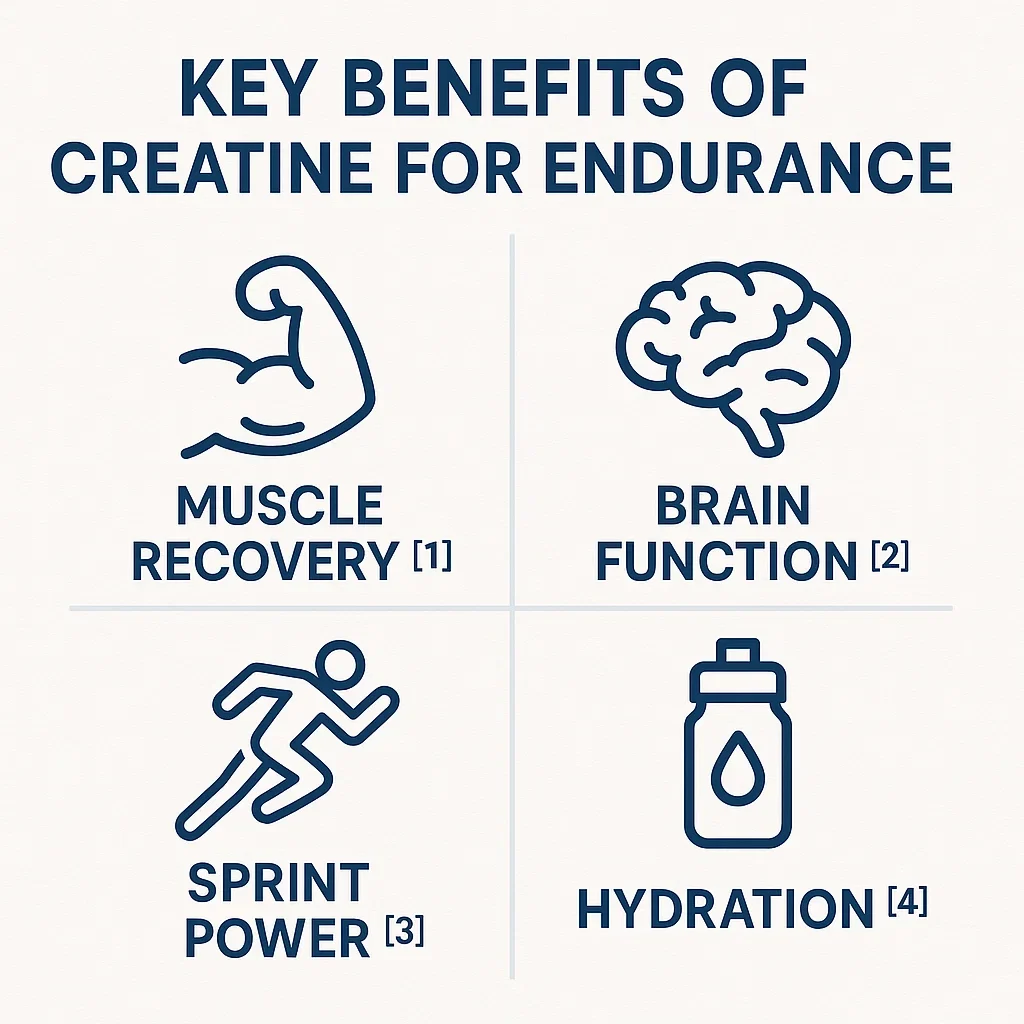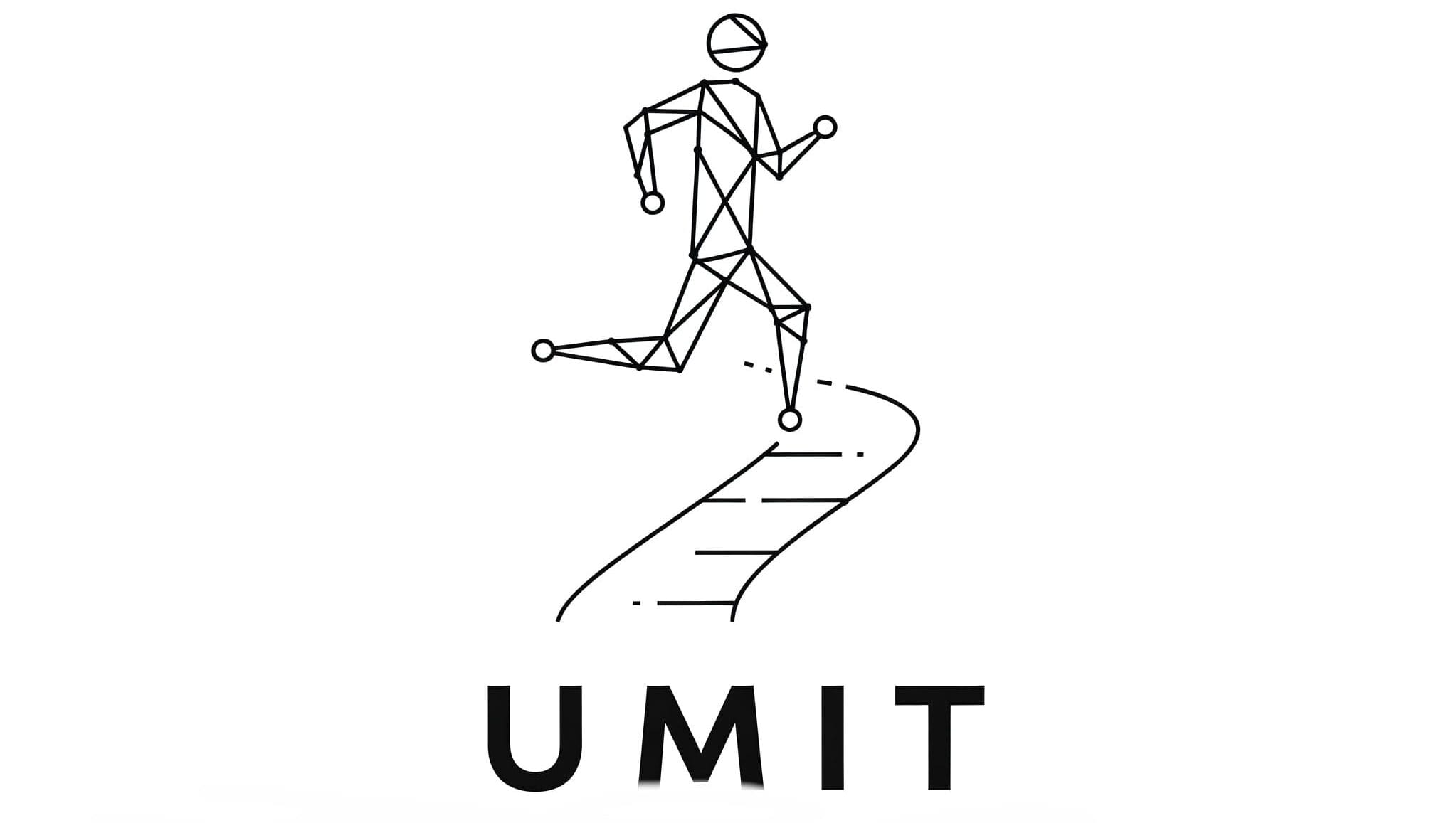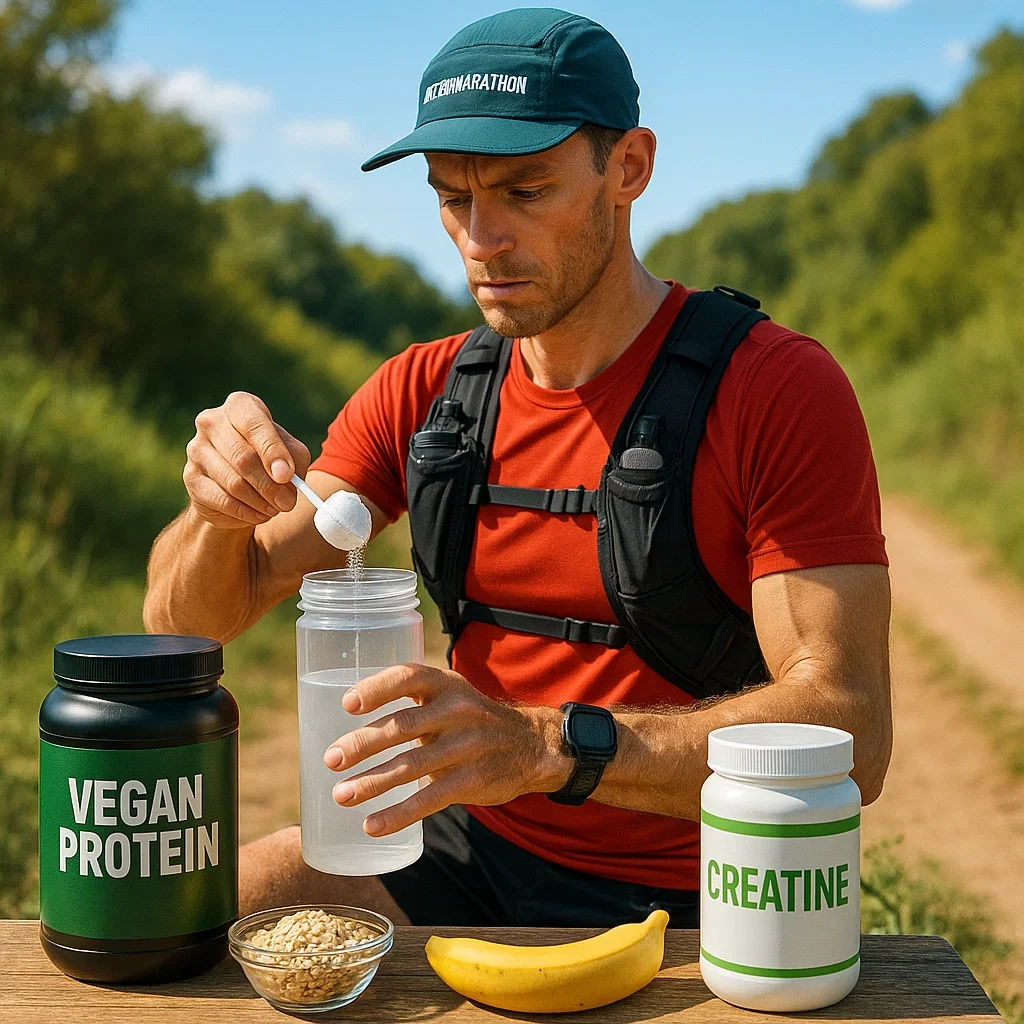⚡ Vegan Creatine Monohydrate Supplementation for Ultramarathoners
Creatine isn’t just for gym rats—it’s a plant-powered ultra runner’s secret weapon! If you’re pushing boundaries on a vegan diet, “vegan creatine ultra” strategies can unlock more endurance, faster recovery, and next-level brain resilience.
Ready to separate myth from science, find the cleanest vegan-friendly brands, and put creatine to work for your next finish line? Let’s dig in!
🧬 Science-Backed Benefits of Creatine for Vegan Runners
While most creatine headlines target strength, the real ultra-power comes from what it does for endurance—especially for vegan athletes:
- 💪 Boosts muscular endurance: Increases time to fatigue on back-to-back long runs and mountain races.
- ⚡ Speeds up muscle recovery: Less soreness and quicker bounce-back after ultras (Forbes et al., 2021).
- 🧠 Supports brain function: Protects mental sharpness and reaction time in long, hot events (Avgerinos et al., 2018).
- 🚰 Improves cell hydration: Creatine draws water into muscle cells, helping with thermoregulation on hot days.
- 🌱 Bridges the vegan gap: Plant-based diets are naturally low in creatine—supplementing can close this crucial gap for ultra athletes.
🏆 Top Vegan-Friendly Creatine Brands & How to Choose
Not all creatine is created equal! For the cleanest “vegan creatine ultra” strategy, look for pure creatine monohydrate from vegan-certified brands, with no additives or fillers:
⏱️ Optimal Dosage and Usage Protocols for Endurance Athletes
Wondering how much creatine to take—and when? Here’s the practical, research-backed approach for ultra runners and endurance athletes:
- 🧪 Loading phase (optional): 20g/day (split in 4–5 doses) for 5–7 days. Not required, but saturates muscles quickly.
- 🏃♂️ Maintenance dose: 3–5g/day, taken any time (with or without food) for long-term benefits.
- 🚰 Hydration: Drink extra water (creatine pulls fluid into muscle cells—good for hot ultras but needs consistent hydration).
- ⏳ Cycle? No need. Creatine is safe for continuous use; cycle only if desired for personal preference.
- 📅 Race week: Start 1–2 weeks before event; keep taking during and after race for best recovery and performance.
🔬 Research Review: Creatine’s Impact on Endurance Performance
Skeptical about creatine for ultra-endurance? The latest research proves it’s not just for sprinters or lifters. Here’s what the science says:
- 🏃♀️ Longer time to exhaustion: Creatine extends endurance, especially in events with repeated surges or hills (Volek et al., 2021).
- 🩹 Faster recovery: Multiple studies show reduced muscle damage and inflammation post-ultra with regular supplementation.
- 🧠 Brain protection: Creatine acts as a brain energy buffer—supporting mental clarity and reducing “ultra brain fog” during long races (Avgerinos et al., 2018).
- 🔥 Power when you need it: Improved sprint finish and uphill surges even after hours on the trail.
- 🌱 Vegan/vegetarian response: Plant-based athletes show bigger gains due to naturally lower creatine stores (Brosnan & Brosnan, 2016).
🌟 Real-World Tips and Common Myths
Not sure if creatine fits your plant-based ultra journey? Here’s what top runners and coaches say—and the biggest myths busted:
- 🥤 Mix with juice or water: Creatine is flavorless—no need for fancy drinks or expensive mixes.
- 🌿 100% vegan certified: Check for “vegan creatine” on the label, and avoid any blends with animal-derived fillers.
- 🧊 Take anytime: Consistency > timing—morning, evening, or after your run all work.
- 🚫 Myth: “Creatine causes bloating.” At the proper dose (3–5g), bloating is rare, especially with modern micronized forms.
- 🧬 Myth: “Creatine is only for bodybuilders.” Fact: Endurance, recovery, and brain benefits are now clinically proven—especially for vegan athletes!
❓ FAQ: Vegan Creatine for Ultra-Endurance
🌱 Is all creatine vegan?
💊 Do I need a loading phase?
🏃♂️ Can creatine help with ultra distances?
🚰 Does creatine require extra hydration?
⚡ Is micronized creatine better?
⏳ Can I cycle off creatine?
🧠 Does creatine help with “ultra brain fog”?
📚 Further Reading & Resources
Recommended External Links
🌟 Final Thoughts
Vegan creatine monohydrate is one of the simplest, safest, and most effective ways to upgrade endurance, speed recovery, and sharpen your brain for ultra challenges. With science on your side—and the cleanest brands at your fingertips—you’re ready for your strongest finish yet!
Got a question, tip, or favorite vegan creatine hack? Drop it below and join the Lost Pace community!

📝 Quick Quiz: Creatine & Ultra-Endurance
- What is the ideal daily maintenance dose of creatine monohydrate for endurance athletes?
- Which form of creatine is best for vegan athletes?
- Name two research-backed benefits of creatine for ultra runners.
- True or False: All creatine supplements are vegan-friendly by default.
- When is the optimal time to start creatine before an ultramarathon?
✅ Quiz Answers
- 3–5g per day
- Micronized creatine monohydrate with vegan certification
- Faster recovery, brain protection, longer time to fatigue
- False (always check labels for vegan status)
- At least 1–2 weeks before your race; continue during event week
🏅 7-Day Creatine Loading Challenge
- Commit to a 7-day loading phase: 20g/day (split in 4–5 doses)
- Track your energy, mental focus, and recovery each day in a simple journal or app
- After loading, shift to 3–5g/day maintenance
- Share your results and tips in the comments—what changed in your long run?
🏆 What the Pros Say: Creatine in Real Ultra Life
“I was skeptical, but after adding vegan creatine to my build-up, I bounced back faster from long runs. My back-to-back ultras felt smoother, and I noticed less mental fatigue late in the day.”
— Emma J., Sub-24hr Trail 100M finisher
“Creatine was the only supplement that noticeably helped with muscle soreness after my peak weeks. I’ve used both Bulk Powders and Creapure—both worked well for plant-based fueling.”
— Dr. Luis M., Plant-Based Ultra Coach
“As a vegan marathoner moving up to ultras, I wanted every edge. Creatine gave me confidence on big climbs and at the finish—without any side effects.”
— Martin K., Elite Mountain Runner
💬 Your Turn: Share, Comment, Connect!
📊 Quick Poll: Have You Tried Vegan Creatine?

About the Author
Lost Pace is an ultramarathon runner, shoe-tester and the founder of umit.net. Based year-round in Türkiye’s rugged Kaçkar Mountains, he has logged 10,000 + km of technical trail running and completed multiple 50 K–100 K ultras.
Blending mountain grit with data, Lost analyses power (CP 300 W), HRV and nutrition to craft evidence-backed training plans. He has co-written 260 + long-form guides on footwear science, recovery and endurance nutrition, and is a regular beta-tester of AI-driven coaching tools.
When he isn’t chasing PRs or testing midsoles, you’ll find him sharing peer-reviewed research in plain English to help runners train smarter, stay healthier and finish stronger.
Ultrarunner · Data geek · Vegan athlete

